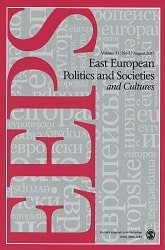Acting Out: Qui pro Quo in the Context of Interwar Warsaw
Acting Out: Qui pro Quo in the Context of Interwar Warsaw
Author(s): Beth HolmgrenSubject(s): Theatre, Dance, Performing Arts, Cultural history, Local History / Microhistory, Social history, Interwar Period (1920 - 1939), Sociology of Art, History of Art
Published by: SAGE Publications Ltd
Keywords: Dymsza; Krukowski; cabaret; Warsaw;
Summary/Abstract: In the turbulent context of interwar Polish politics, a period bookended by the rightwing nationalists’ repression of an ethnically heterogeneous state, several popular highquality cabarets persisted in Warsaw even as they provoked and defied the nationalists’ harsh criticism. In their best, most influential incarnation, Qui pro Quo (1919–1932) and its successors, these literary cabarets violated the right’s value system through their shows’ insistent metropolitan focus, their stars’ role-modeling of immoral behavior and parodic impersonation, and their companies’ explicitly Jewish–Gentile collaboration. In the community of the cabaret, which was even more bohemian and déclassé than that of the legitimate theater, the social and ethnic antagonisms of everyday Warsaw society mattered relatively little. Writers and players bonded with each other, above all, in furious pursuit of fun, fortune, celebrity, artistic kudos, and putting on a hit show. This analysis details how the contents and stars of Qui pro Quo challenged right-wing values. Its shows advertised the capital as a sumptuous metropolis as well as a home to an eccentric array of plebeian and underworld types, including variations on the cwaniak warszawski enacted by comedian Adolf Dymsza. Its chief female stars—Zula Pogorzelska, Mira Zimińska, and Hanna Ordonówna—incarnated big-city glamour and sexual emancipation. Its recurring Jewish characters—Józef Urstein’s Pikuś and Kazimierz Krukowski’s Lopek—functioned as modern-day Warsaw’s everymen, beleaguered and bedazzled as they assimilated to city life. Qui pro Quo’s popular defense against an exclusionary nationalism showcased collaborative artistry and diverse, charismatic stars.
Journal: East European Politics and Societies
- Issue Year: 27/2013
- Issue No: 02
- Page Range: 205-223
- Page Count: 19
- Language: English
- Content File-PDF

